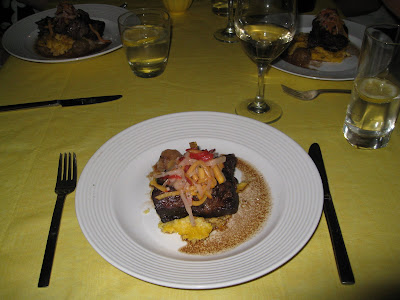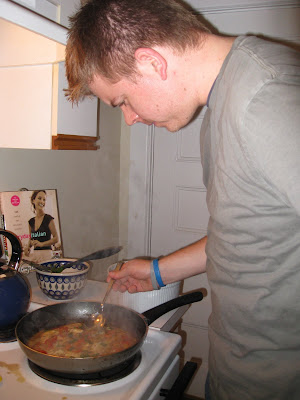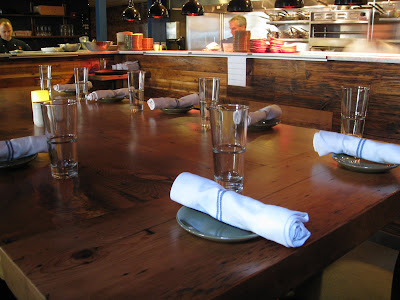when i cook, it's an unrehearsed and impromptu series of miscalculated actions that eventually add up to a meal. i cook on a whim, picking things at random in the grocery aisles that give me that gut feeling of yeah, this'll work, and doing the same when i get home. if i'm marinating a protein, i open the fridge and wonder what might enhance and build upon what i've got. orange juice, mustard, soy sauce
, chocolate. loose tea, even. i just go with it. like i said, unrehearsed and impromptu.
my favorite way to cook, if i have the time for it, is to braise. when i braise, i like using liquids that some people would probably find absolutely revolting. i might draw on inspiration from the classic recipe of a dish, utilizing technique and methods, but substituting for my own crazy ingredients—like i did last christmas when i made a short rib crostini for a family party or last june in cambridge when we had some friends over for a farewell dinner.

any traditional recipe for short ribs will have you start the beef off by browning it in the pan, followed by the vegetables—which will always call for a
mirepoix—in the fat drippings from the beef, and then throwing it all together and topping the whole thing off with either chicken or beef stock, and a hearty red wine. this always makes one of my favorite meals, but i just can't bring myself to go at it this way. i was never diagnosed with a.d.h.d. as a kid, but i don't know, cuz i just can't handle going by the book. my mom jumps out of her skin when she touches cotton balls, and i do the same when following recipes. it's like bill murray in
what about bob?, gill the goldfish hanging from his neck, just not able to get on that greyhound bus.
so instead, like bob, i liberate myself.

for those christmas crostinis i browned the beef in butter that i richened with duck fat and used leeks and parsnips and shallots as my flavor base. to braise, i poured in guava juice and a touch of ginger ale and, because it's just too hard to replace the richness of a stock, chicken stock. for whatever idiotic reason, i never took a picture of the final result—but for imagination's sake, i topped the beef off with a mint, pineapple and pomegranate salad, pineapple juice and honey that i reduced to a thick syrup, and
crème fraîche. maybe i went overboard with the natural sweeteners on the thing, but that's where i always find myself. i love big flavors, especially those i can draw from fruits. and i either have an incredibly kind and thoughtful family that looked out for those gentle and oh so sensitive feelings i have, or they went over well, because everything was eaten, and seemingly happily so.
but, i wouldn't wish my way of thinking in the kitchen on anyone. there's no process to the way i work. it's simply just madness. but, the one thing i will say, is that it keeps me in there for a long, long time.

before the release of
julie and julia a couple weeks ago,
the nytimes magazine ran a lengthy piece titled
"out of the kitchen, onto the couch" written by
michael pollan, who has single handedly not only lifted the country's food iq, but helped give rise to the buy local, your farmer is your neighbor movement. in it, pollan questions the amount of time we spend in the kitchen, especially in lieu of the food boom on tv. ordinary people, who twenty years ago had to put in near seventy hour work weeks to make a comfortable living cooking food, are now hot, celebrity commodities. even in the picture above you can see a giada de laurentiis cookbook that alicia and her roommates displayed in their kitchen, giada a commodity of the instigator of this whole thing, the food network. so we sit for hours watching paula dean work her southern charm and budding chefs haul it in the kitchen on
top chef, but yet, pollan asks, the average person doesn't even spend thirty minutes a day in his or her own kitchen? it's a matter of blatant hypocrisy.

in the season premiere of
mad man last night, after receiving a long-awaited promotion, a character calls his wife and to celebrate, asks her to make a reservation—no request, just a surprise, he says. dining out, here, is a cause for absolute celebration. both of my parents have told me that eating out was a rare occasion growing up, and these are two people who grew up on opposite ends of the country. but neither of them would be afraid to tell you that raising me and my brothers, we ate out with consistent frequency—though the difference is, and this rings true for the character's wife in
mad men as well, my mom did spend several days a week in the kitchen, cooking a dinner that would be ready when my dad came home from work in the evening. so what's happened? why are we becoming so obsessed with food, literally raising the thing on so high a pedestal as to make it a phenomenon, that we worship those who cook and study it, yet fail to do the same ourselves? why is that we shell out our money at the restaurants of the celebrity chef, rather than attempt to emulate what it is they practice?

where did the days of home pickling go? the passing of summers spent in the kitchen between parent and child preserving fresh berries? cooking is not a thing that requires heat and a plate and a set table. our conception of cooking has drastically narrowed, and we've forgotten what it is to feed off the land we've been given. our focus is far too manufactured, manipulated over time via media and advertising and the passed and continued phenomena of food. is it so absurd to purchase a juicer, and not even an electronic one, but a classic, prism shaped juicer, so that when coming home with those oranges from the farmers' market one might make
fresh. squeezed. orange juice?
my time in the kitchen is spent as a nutjob. i work with a one-track mind, always thinking several steps ahead, the intent to hone in on how best to heighten the flavors of what i'm working with. and this, by nature, takes a lot of time. i don't do this to follow what i preach, nor what michael pollan says, because i think it might, and should, be the next wave of the food phenomenon. rather, i do it because it's instinctual. it's the nature of the thing. i simply cannot help myself.
i'm all for whole foods. i feel comfortable buying my meat and seafood and produce there, and trust it to be organic and local as succinctly labeled. but there is a
brand new whole foods in lincoln park that we shop at, and the thing is huge. there is an espresso bar next to a beer bar up front and by the cheese and wine, there is a small cafe where someone is always on hand to pour flights that are paired, fittingly enough and if you so choose, with cheese. there's also an extremely large food court, with far more than just the signature whole foods pay-by-the-pound spread, which explains why the market itself is so large. there's a culinary rainbow of foods to choose from that literally equates to whole-foods-fast-food. and doesn't that seem so wrong that the sound of it doesn't even make any natural sense? near the close of his article, michael pollan is told that takeout from supermarkets is the wave of the future. well, the arrival has begun.
we're in danger of being even further removed from the creation of our own food. but the danger in this will never be apparent, because given the increasing speed of the world, the ease of what's been presented to us is just too much to pass on. fast food is so
passé , but food courts in organic supermarkets that make food fast? sign me up, right?!?

michael pollan calls for an exorcism of sorts of julia child, the american cook who learned the ways of doing so from scratch, in the home, and how approachable she made it all seem. and the thing is, it is approachable. and it's also doable. i'd love to see a movement away from the ease of buying prepared food, away from the hype and glamour of the celebrity chef, and back to my father's parents who for several summers moved their family to a new york farm. back to my mother's parents who plucked the oranges from their three trees and poured the squeezed juice at the breakfast table, then offered a large paper bag full of more of the fruit for us to take home.
my methods might be unrehearsed and impractical, but nothing i do ever brings me closer to the process of raising and maintaining our foodstuff. we all care about longevity and health, so shouldn't the food we eat be treated with the same delicacy and care we give to our bodies? despite their status, i bet if you ask the celebrity chef this same question, they'd hands down agree. the difference is, given their ability to do so, it's time to start doing something about it.
 six years ago this weekend all ten of their kids and spouses, and twenty-five grandchildren, were at lake george to celebrate their fiftieth anniversary. today makes fifty-six. it's a large family, and it's remarkable how well the family gets along. you'd think anytime the families gather it was a reunion of college friends, and not brothers and sisters. as a child, i looked to my nana and papa as though they were saints. they held this mythical sort of air in my mind, and it was unheard of in my subconscious to ever even dream of crossing either of them. i was no angel as a kid, but in their presence, i at least attempted—though not always successfully—to be nothing less. it's a testament to their union, and again, the endless love they've showered upon their family.
six years ago this weekend all ten of their kids and spouses, and twenty-five grandchildren, were at lake george to celebrate their fiftieth anniversary. today makes fifty-six. it's a large family, and it's remarkable how well the family gets along. you'd think anytime the families gather it was a reunion of college friends, and not brothers and sisters. as a child, i looked to my nana and papa as though they were saints. they held this mythical sort of air in my mind, and it was unheard of in my subconscious to ever even dream of crossing either of them. i was no angel as a kid, but in their presence, i at least attempted—though not always successfully—to be nothing less. it's a testament to their union, and again, the endless love they've showered upon their family.






































